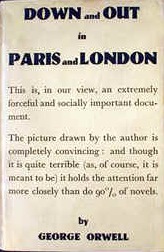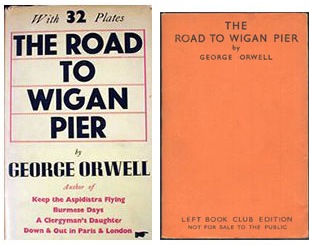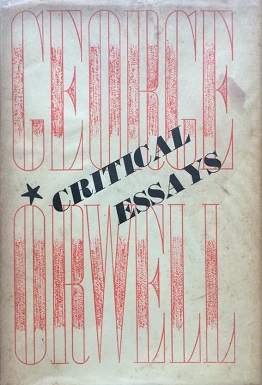Related Research Articles

Eric Arthur Blair, better known by his pen name George Orwell, was a British novelist, essayist, journalist, and critic. His work is characterised by lucid prose, social criticism, opposition to totalitarianism, and support of democratic socialism.

Keep the Aspidistra Flying, first published in 1936, is a socially critical novel by George Orwell. It is set in 1930s London. The main theme is Gordon Comstock's romantic ambition to defy worship of the money-god and status, and the dismal life that results.

Down and Out in Paris and London is the first full-length work by the English author George Orwell, published in 1933. It is a memoir in two parts on the theme of poverty in the two cities. Its target audience was the middle- and upper-class members of society—those who were more likely to be well educated—and it exposes the poverty existing in two prosperous cities: Paris and London. The first part is an account of living in near-extreme poverty and destitution in Paris and the experience of casual labour in restaurant kitchens. The second part is a travelogue of life on the road in and around London from the tramp's perspective, with descriptions of the types of hostel accommodation available and some of the characters to be found living on the margins.

The Road to Wigan Pier is a book by the English writer George Orwell, first published in 1937. The first half of this work documents his sociological investigations of the bleak living conditions among the working class in Lancashire and Yorkshire in the industrial north of England before World War II. The second half is a long essay on his middle-class upbringing, and the development of his political conscience, questioning British attitudes towards socialism. Orwell states plainly that he himself is in favour of socialism, but feels it necessary to point out reasons why many people who would benefit from socialism, and should logically support it, are in practice likely to be strong opponents.

John Middleton Murry was an English writer. He was a prolific author, producing more than 60 books and thousands of essays and reviews on literature, social issues, politics, and religion during his lifetime. A prominent critic, Murry is best remembered for his association with Katherine Mansfield, whom he married in 1918 as her second husband, for his friendship with D. H. Lawrence and T. S. Eliot, and for his friendship with Frieda Lawrence. Following Mansfield's death, Murry edited her work.
A Hanging (1931) is a short essay written by George Orwell, first published in August 1931 in the British literary magazine The Adelphi. Set in Burma, where Orwell had served in the British Imperial Police from 1922 to 1927, it describes the execution of a criminal.
John Rayner Heppenstall was a British novelist, poet, diarist, and a BBC radio producer.
Hugh Gordon Porteus (1906–1993) was an influential reviewer of art and literature in the London of the 1930s, and also a poet. He was an admirer of Wyndham Lewis and wrote the first critical book on him, published in 1932. Lewis portrayed Porteus as the character "Rotter" Parkinson in his novel Self Condemned.
Jack Common was a British socialist, essayist and novelist.
"Inside the Whale" is an essay in three parts written by George Orwell in 1940. It is primarily a review of Tropic of Cancer by Henry Miller with Orwell discursing more widely over English literature in the 1920s and 1930s. The biblical story of Jonah and the whale is used as a metaphor for accepting experience without seeking to change it, Jonah inside the whale being comfortably protected from the problems of the outside world. It was published, alongside two other pieces by Orwell, 11 March 1940 by Gollancz in Orwell's first collection of essays, Inside the Whale and Other Essays.
Mark Plowman, generally known as Max Plowman, was a British writer and pacifist.
The Adelphi or New Adelphi was an English literary journal founded by John Middleton Murry and published between 1923 and 1955. The first issue appeared in June 1923, with issues published monthly thereafter. Between August 1927 and September 1930 it was renamed the New Adelphi and issued quarterly. Murry was editor until 1930, when he handed over to Sir Richard Rees and the monthly issues resumed. Rees was succeeded by Max Plowman in 1938. The magazine included one or two stories per issue with contributions by Katherine Mansfield, A.A. Milne, D. H. Lawrence, H. E. Bates, Rhys Davies, G.B. Edwards and Dylan Thomas. The Adelphi published George Orwell's "The Spike" in 1931 and Orwell contributed regularly thereafter, particularly as a reviewer; in the late 1930s/early 1940s, working class writers Jack Common and Jack Hilton also contributed.
Sir Richard Lodowick Edward Montagu Rees, 2nd Baronet was a British diplomat, writer, humanitarian, and painter.
The Criterion was a British literary magazine published from October 1922 to January 1939. The Criterion was, for most of its run, a quarterly journal, although for a period in 1927–28 it was published monthly. It was created by the poet, dramatist, and literary critic T. S. Eliot who served as its editor for its entire run.
"Confessions of a Book Reviewer" is a narrative essay published in 1946 by the English author George Orwell. In it, he discusses the lifestyle of a book reviewer and criticises the practice of reviewing almost every book published, which gives rise to this lifestyle.

The bibliography of George Orwell includes journalism, essays, novels, and non-fiction books written by the British writer Eric Blair (1903–1950), either under his own name or, more usually, under his pen name George Orwell. Orwell was a prolific writer on topics related to contemporary English society and literary criticism, who has been declared "perhaps the 20th century's best chronicler of English culture." His non-fiction cultural and political criticism constitutes the majority of his work, but Orwell also wrote in several genres of fictional literature.

Charles Du Bos was a French essayist and critic, known for works including Approximations (1922–37), a seven-volume collection of essays and letters, and for his Journal, an autobiographical work published posthumously from 1946 to 1961. His other work included Byron et le besoin de la fatalité (1929), a study of Lord Byron, and Dialogue avec André Gide, an essay on his friend André Gide. Influenced by thinkers including Henri Bergson, Georg Simmel and Friedrich Nietzsche, Du Bos was well-known as a literary critic in France in the 1920s and 1930s. He maintained a distance from the political developments of those decades, while nonetheless seeking in his writing to reframe political phenomena as ethical problems. Alongside Gide and the American novelist Edith Wharton, he was involved in providing aid to Belgian refugees in Paris following the 1914 German invasion of Belgium. Raised Catholic, Du Bos lost his faith as a young man, then regained it in 1927, and regarded this conversion as the central event of his life.

Carl Eric Bechhofer Roberts was a British author, barrister, and journalist.

Critical Essays (1946) is a collection of wartime pieces by George Orwell. It covers a variety of topics in English literature, and also includes some pioneering studies of popular culture. It was acclaimed by critics, and Orwell himself thought it one of his most important books.

Jack Hilton was a British outsider novelist and essayist adopted into the modernist movement of the 1930s. Hilton's works were experimental, using semi-autobiographical first-person narratives and internal monologue to probe the relation of events in his life - and the lives of his characters - to the feelings and attitudes of himself and his subjects. His writing was also unconventional at the time of its publication for its proud but critical depictions of working-class people and settings, centring on his native Lancashire.
References
- ↑ D. J. Taylor Orwell: The Life Chatto & Windus 2003